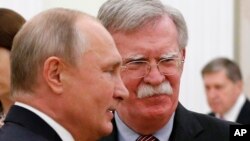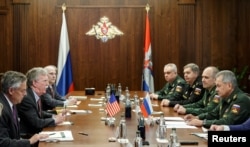President Donald Trump’s National Security Adviser John Bolton said Tuesday says plans are being made for the U.S. president to meet with his Russian counterpart, Vladimir Putin, next month in Paris.
"We will make precise arrangements on that," Bolton said at a Moscow news conference after meeting with Putin to discuss why Trump wants to pull out of the 1987 Intermediate-Range Nuclear Forces Treaty.
Russian presidential aide and foreign policy veteran Yuri Ushakov said before the news conference a preliminary agreement had been reached for the two leaders to meet in Paris on November 11, when France observes Armistice Day.
Bolton said he had "a series of very comprehensive and productive discussions" with Putin, including talks on arms control and Trump's decision to withdraw from the INF treaty.
Bolton also said he raised the issue of Russia's interference in U.S. elections and warned continuing to do so would be counter-productive for Russia.
Earlier Tuesday, Bolton hinted the arms control pact with Russia may have run its course.
Meeting with Shoigu
He also met with Russian Defense Minister Sergei Shoigu, who applauded Bolton for his two-day visit to Moscow and said "even small steps will benefit our relations and help restore trust" between the two countries.
"There are a large number of problems in the world that we could solve through joint efforts," Shoigu added.
Bolton said he was in Moscow to reinforce Trump's commitment to improve security cooperation with Russia.
"We certainly share your view the U.S.-Russian discussions with respect to Syria have been useful, productive and professional, and we hope we can extend those conversations through a number of other ways that you mentioned, and even more," Bolton said.
Trump said he wanted to withdraw from the treaty after accusing Russia of violating the agreement.
"We don't think that withdrawal from the treaty is what causes the problem. We think it's what Russia has been doing in violation of the treaty that's the problem," Bolton told Russia's Kommersant newspaper on Monday. "You can't bring someone in compliance who does not think they are in breach."
Relevance questioned
Bolton said he believes Cold War-era bilateral treaties are no longer relevant because of today's global security environment, where other countries are also building missiles.
Former Soviet leader Mikhail Gorbachev and the late U.S. President Ronald Reagan signed the INF accord in 1987. It bans the United States and Russia from building, testing, and stockpiling ground-launched nuclear missiles with a range from 500 to 5,000 kilometers.
Trump said the United States would have to start developing new weapons if Russia and China, which is not part of the INF treaty, do.
Russia denies violating the agreement and says it is U.S. missile defense systems in Europe that are in violation.
A Putin spokesman says a U.S. pullout from the INF treaty would make the world a more dangerous place. He said Russia would have to take security countermeasures to "restore balance."
Russian National Security Council chief Nikolai Patrushev said after his talks Monday with Bolton that Russia is willing to talk with the United States about the mutual complaints against one another in a bid to salvage the INF pact.
A Russian statement Monday said Bolton and Patrushev discussed a possible five-year extension of another arms control agreement, the Strategic Arms Reduction Treaty. That deal took effect in 2011 and is set to expire in 2021.
Defense advocates in Washington say the INF treaty keeps the United States from developing a new generation of weapons in a world that faces new global security challenges.







